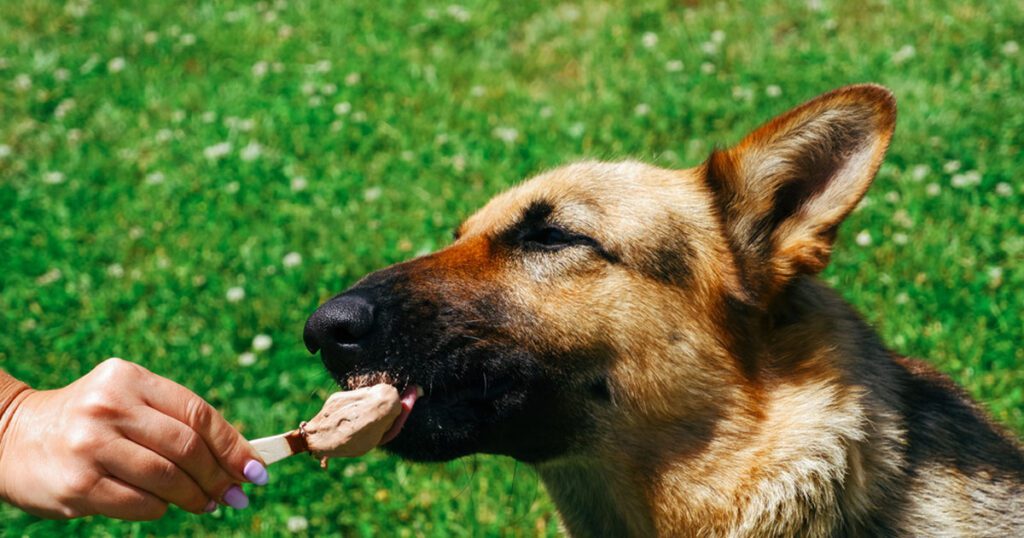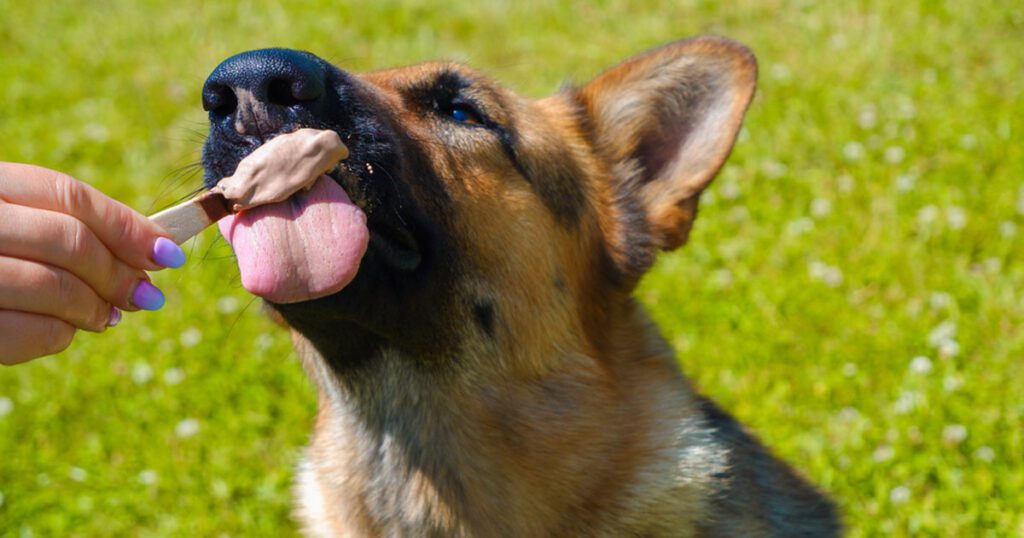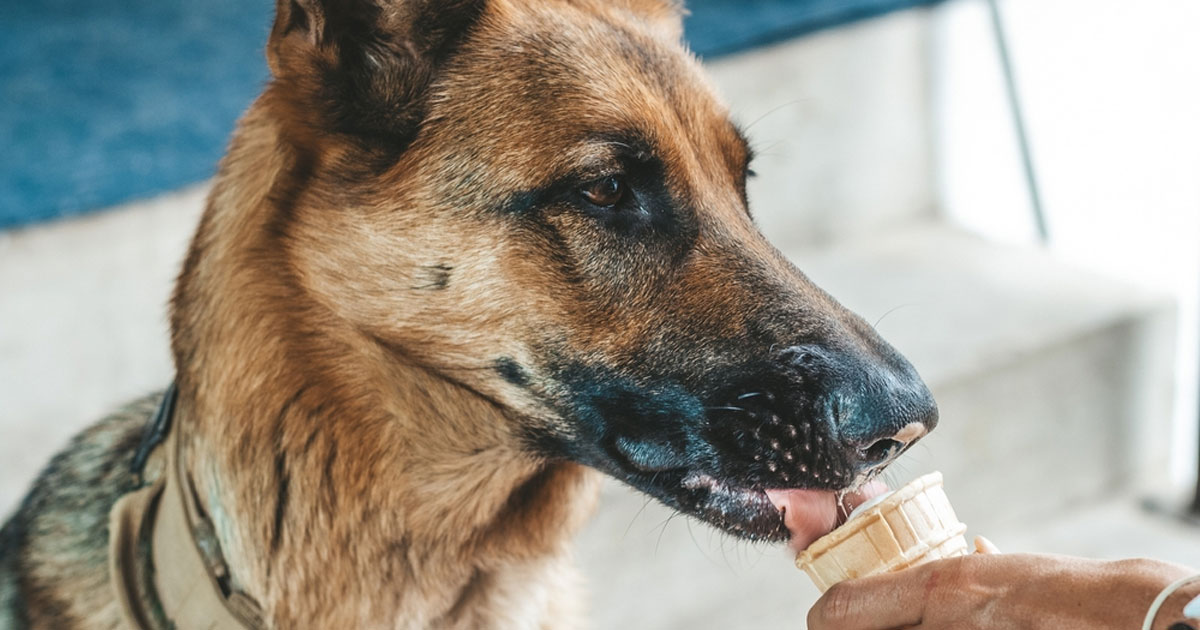German Shepherds are renowned for their loyalty, intelligence, and playful nature. As a dog owner, it’s natural to wonder if your German Shepherd can indulge in a sweet treat like ice cream. It’s essential to understand the potential risks associated with feeding ice cream to your furry companion.
While German Shepherds can technically eat ice cream, it is generally not recommended to feed it to them. Ice cream is a dairy product, and many dogs, including German Shepherds, are lactose intolerant or have difficulty digesting dairy.
Consuming ice cream can cause digestive issues such as diarrhea, vomiting, and gas in dogs that are lactose intolerant. Additionally, ice cream often contains ingredients that are not suitable for dogs, such as sugar, artificial sweeteners, and flavorings.
In this article, we’ll delve into the topic of German Shepherds and ice cream, exploring the potential risks it poses and suggesting safe alternatives. Let’s start.
Table of Contents
Can German Shepherds Safely Consume Ice Cream?
No, German Shepherds should not eat ice cream. German Shepherds are known for their robust nature, but when it comes to ice cream, caution is advised.
While some German Shepherds may tolerate small amounts of ice cream, others may experience adverse reactions. It’s crucial to consider individual factors that can affect their tolerance.
Factors such as age, overall health, and any existing dietary restrictions play a significant role.
Moderation and portion control are vital when considering treats like ice cream. Overindulgence can lead to digestive issues, obesity, and potential complications associated with excessive sugar intake.
It’s always best to consult with your veterinarian before introducing ice cream into your German Shepherd’s diet.
Factors to Consider Before Feeding Ice Cream to Your German Shepherd
| Individual Factors | Tolerance | Recommendations |
| Age | Varies | Consider age-related tolerance levels |
| Overall Health | Varies | Consult with a veterinarian for dogs with health issues or allergies |
| Dietary Restrictions | Varies | Account for existing dietary restrictions or sensitivities |
Understanding the German Shepherd Diet
When it comes to the German Shepherd’s diet, nutrition is key to their overall well-being. German Shepherds are active dogs with high energy requirements, necessitating a balanced and nutritious diet.
They thrive on a diet rich in high-quality proteins, such as lean meats, along with a variety of vegetables, fruits, and whole grains.
Adequate amounts of vitamins, minerals, and omega-3 fatty acids are essential for their joint health and coat condition.
A well-rounded diet supports their immune system, promotes muscle development, and maintains optimal weight. Providing a nutritionally balanced diet is crucial for German Shepherds to lead healthy, active lives.

Risks of Feeding Ice Cream to German Shepherds
Feeding ice cream to your German Shepherd may seem harmless, but it’s important to be aware of the potential risks involved.
Ice cream typically contains ingredients and additives that may not be suitable for dogs. Let’s take a closer look at why ice cream can be problematic for German Shepherds.
The ingredients and composition of ice cream can be concerning.
Many varieties contain high levels of sugar, artificial sweeteners, and additives that can be harmful to dogs.
Additionally, some ice creams may include chocolate, which is toxic to dogs. It’s crucial to read the labels carefully and understand the potential allergens or harmful substances present in ice cream.
Lactose intolerance is another factor to consider
Like humans, some dogs may have difficulty digesting lactose, a sugar found in milk products.
Feeding ice cream to a lactose-intolerant German Shepherd can lead to digestive upset, including diarrhea, bloating, and discomfort.
Common Health Issues Associated with Ice Cream Consumption
While ice cream may be a delicious treat for humans, it can pose several health risks to German Shepherds. It’s essential to understand the potential health issues that can arise from ice cream consumption.
Excessive sugar intake is a primary concern
Ice cream is typically high in sugar, and consuming excessive amounts can lead to weight gain, obesity, and dental problems in German Shepherds. The sugar content can also contribute to the development of diabetes and other metabolic disorders in dogs.
The high-calorie content of ice cream, coupled with a sedentary lifestyle, can lead to weight gain, which puts additional strain on your German Shepherd’s joints and overall health.
Obesity increases the risk of various health issues, including heart disease, joint problems, and reduced life expectancy.
Furthermore, the rich and fatty nature of ice cream can cause digestive problems in dogs. German Shepherds may experience stomach upset, diarrhea, or vomiting after consuming ice cream, especially if their digestive system is sensitive.
Signs of Ice Cream Intolerance or Allergies in German Shepherds
While some German Shepherds may tolerate ice cream, others may experience adverse reactions or allergies.
It’s important to be able to recognize the signs of intolerance or allergic reactions to ensure the well-being of your furry friend. Here are some common symptoms to watch out for:
- Digestive Issues: Diarrhea, vomiting, gas, or bloating can indicate a negative reaction to ice cream.
- Skin Irritation: Itching, redness, rashes, or hives may indicate an allergic response.
- Respiratory Problems: Coughing, wheezing, difficulty breathing, or sneezing can be signs of an allergic reaction.
- Lethargy or Discomfort: If your German Shepherd seems unusually tired, restless, or uncomfortable after consuming ice cream, it could be a sign of intolerance.
If you notice any of these symptoms after feeding your German Shepherd ice cream, it’s crucial to discontinue the treatment and consult with your veterinarian.

What Are Some Delicious Alternatives to Ice Cream for German Shepherds?
If you want to treat your German Shepherd without the potential risks of ice cream, there are plenty of healthy and dog-friendly alternatives available. Here are some delicious options that your furry friend is sure to enjoy:
- Frozen Fruit Treats: Offer frozen fruits like watermelon, blueberries, or banana slices. These provide a refreshing and naturally sweet option for your German Shepherd.
- Yogurt-Based Treats: Plain, unsweetened yogurt can be frozen into bite-sized treats. You can also mix in small amounts of dog-safe fruits like strawberries or apples for added flavor.
- Peanut Butter Delights: Stuff a Kong toy with peanut butter and freeze it for a long-lasting and tasty treat. Ensure the peanut butter doesn’t contain xylitol, as it can be toxic to dogs.
Homemade Frozen Treats: Prepare homemade frozen treats using ingredients like plain yogurt, pumpkin puree, or chicken broth. There are many recipes available online that cater specifically to dogs.
Frequently Asked Questions
Q: What happens if my dog eats my ice cream?
Ans: If your dog eats your ice cream, it can lead to various issues such as digestive upset, potential allergic reactions, and in some cases, toxicity depending on the ingredients present.
Q: Can dogs eat chocolate ice cream?
Ans: No, dogs should not eat chocolate ice cream or any chocolate-based products.
Q: Why do dogs love ice cream?
Ans: Dogs may love ice cream because of its creamy texture and sweet taste. Additionally, the cold temperature can provide a refreshing sensation for them.
Q: What age can puppies have ice cream?
Ans: Puppies should not be given ice cream until they have reached an appropriate age and have been weaned off their mother’s milk. Generally, it is recommended to introduce solid foods gradually around 8 weeks of age.
Q: Can dogs eat sugar-free ice cream?
Ans: Sugar-free ice cream may contain artificial sweeteners like xylitol, which can be toxic to dogs. Xylitol can cause a sudden release of insulin in dogs, leading to low blood sugar levels and potential liver damage. It’s crucial to avoid giving dogs sugar-free ice cream or any products containing xylitol.
Q: Can dogs have ice cream in hot weather?
Ans: While dogs may enjoy the cooling sensation of ice cream in hot weather, it’s generally not recommended.
Q: Can dogs eat ice cream sticks?
Ans: No, dogs should not eat ice cream sticks. These sticks can pose a choking hazard or cause intestinal blockages if ingested.
Conclusion
In conclusion, while the idea of sharing a sweet treat like ice cream with your German Shepherd may seem tempting, it’s crucial to prioritize their health and well-being.
German Shepherds can have varying levels of tolerance and potential risks when it comes to consuming ice cream. Factors such as age, overall health, and dietary restrictions play a significant role in determining whether it’s safe for them.
The risks of ingredients, lactose intolerance, and potential health issues associated with excessive sugar intake should be carefully considered.
It’s essential to be vigilant and look out for signs of intolerance or allergies. Instead of risking their health, consider exploring delicious alternatives like frozen fruit treats, yogurt-based options, or homemade frozen delights.

I’m David, an expert contributor and writer, with two furry friends of my own, I know the challenges of raising and caring for dogs. From training to nutrition and health, my goal is to provide valuable insights and advice to help create strong bonds and happy, healthy lives. Find me in Twitter.



